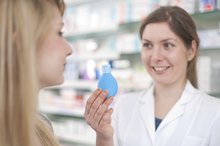White Dots on Skin When Exercising
White dots on the skin can appear on anyone after any type of exercise. People who have certain medical conditions or are taking medications or wearing certain types of fabric may be more likely to develop white spots while exercising. Although white spots after exercise are rarely a cause for medical concern, they can be prevented and treated to lessen any discomfort they cause.
Description
White dots may appear anywhere on your skin during exercise, regardless of whether the skin was covered or uncovered. The dots may be flat or raised. Some dots may fill with pus or itch. Scratching at the dots may cause redness, inflammation, bleeding or flaking of the skin.
- White dots may appear anywhere on your skin during exercise, regardless of whether the skin was covered or uncovered.
- Some dots may fill with pus or itch.
Causes
Exercise Sweating Leading to a Rash Under Breasts
Learn More
White dots that appear on the skin can have a variety of causes. Medical conditions such as tinea versicolor, atopic or contact dermatitis and milia may cause white spots to appear on the skin. People who take acne medications such as tretinoin may develop white spots on the skin while exercising. Exercising outdoors in hot weather can cause heat rash that looks like white dots if you have dark skin, and tight clothing that prevents perspiration from evaporating may cause white dots if your skin pores become clogged with fluid.
- White dots that appear on the skin can have a variety of causes.
- Medical conditions such as tinea versicolor, atopic or contact dermatitis and milia may cause white spots to appear on the skin.
Treatment
If the white dots that appear on your skin during exercise are related to an underlying condition, treating that condition may resolve the dots. Tinea versicolor is a fungal infection that may be treated with prescription or over-the-counter anti-fungal ointment. Treatment options for contact and atopic dermatitis may include over-the-counter or prescription topical steroids such as hydrocortisone or oral or topical antihistamines. Antihistamines may cause drowsiness and should be used with caution after completion of a workout. If the white dots on your skin become infected or if your skin breaks open from scratching, you may require antibiotics.
Consult a physician before undertaking treatment for white dots on your skin if you are uncertain about their cause. Your doctor will have the best information about treating underlying conditions or complications related to white dots that develop on the skin during exercise.
- If the white dots that appear on your skin during exercise are related to an underlying condition, treating that condition may resolve the dots.
Prevention
Red Rashes With a White Ring on the Skin
Learn More
Exercising in a climate-controlled environment may reduce the incidence of white dots on the skin due to sun and heat exposure. Wearing breathable fabrics such as cotton aid the evaporation process so that the dots are less likely to develop from sweating or contact with latex or other allergens. Prescription skin treatments such as ketoconazole can prevent the recurrence of tinea versicolor.
Considerations
If white dots on your skin are accompanied by other symptoms of an allergic reaction such as hives, difficulty breathing or swelling of the tongue or throat, seek prompt medical treatment. If the dots spread to new areas of the skin, especially the eyes, see your doctor. White dots that become painful or increase in size or number should be evaluated by a doctor. Fever and the presence of a foul-smelling fluid draining from the dots are signs of infection and require medical care.
- If white dots on your skin are accompanied by other symptoms of an allergic reaction such as hives, difficulty breathing or swelling of the tongue or throat, seek prompt medical treatment.
- White dots that become painful or increase in size or number should be evaluated by a doctor.
Related Articles
References
Writer Bio
Jessica Lietz has been writing about health-related topics since 2009. She has several years of experience in genetics research, survey design, analysis and epidemiology, working on both infectious and chronic diseases. Lietz holds a Master of Public Health in epidemiology from The Ohio State University.








